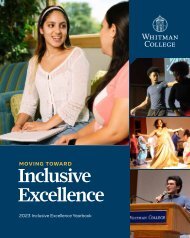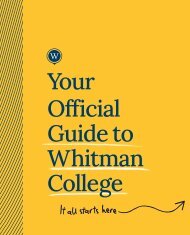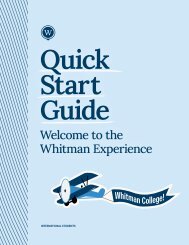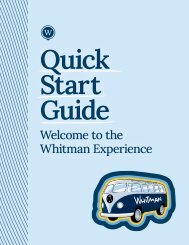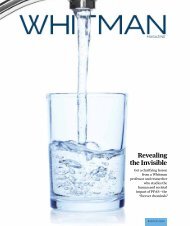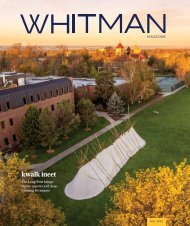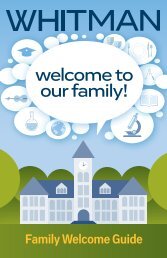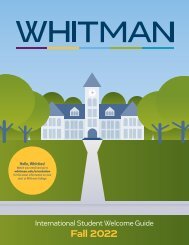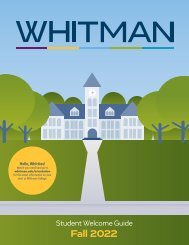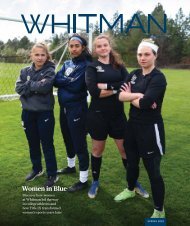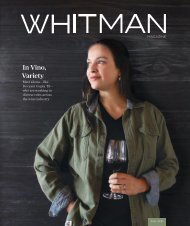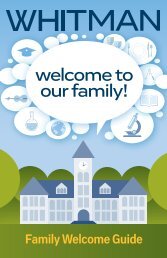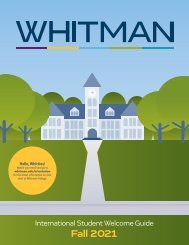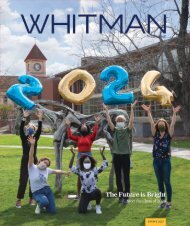Create successful ePaper yourself
Turn your PDF publications into a flip-book with our unique Google optimized e-Paper software.
STUDENT LIFE<br />
Living in<br />
Wellness<br />
<strong>Whitman</strong> Awarded a Grant to<br />
Support Students in Recovery<br />
adjusting to college life can be a challenge for<br />
any student, but perhaps especially so for those who<br />
are in recovery from substance misuse. With two<br />
new programs introduced in the 2021-<strong>2022</strong> academic<br />
year, <strong>Whitman</strong> is actively creating a more supportive<br />
environment for those students.<br />
Wellness House, the newest residence in <strong>Whitman</strong>’s<br />
Interest House Community (IHC), created with the help<br />
of a $60,000 grant from Washington State University’s<br />
Collegiate Recovery Grant Program, is believed to be the<br />
first sober living house on a Washington state college<br />
campus. However, the programming doesn’t focus on<br />
the absence of substances but centers around positive<br />
lifestyle elements instead.<br />
Like <strong>Whitman</strong>’s other Interest Houses, such as La<br />
Casa Hispana and the Fine Arts House, the Wellness<br />
House residents—aided by Resident Advisor Shemaya<br />
Griffin, a junior psychology major from Chicago—are<br />
responsible for hosting regular house programs. Past<br />
activities included a get-together where students were<br />
VISITING VOICES<br />
as a technology reporter<br />
for The New York Times,<br />
Cecilia Kang, a <strong>Whitman</strong><br />
Class of 1994 graduate, has<br />
spent years investigating<br />
Facebook. Her book “An<br />
Ugly Truth,” cowritten with<br />
fellow NYT reporter Sheera<br />
Frenkel and published in June<br />
2021, explores the deleterious effects the social media<br />
giant has had on society and on democracy itself.<br />
Based on more than 400 interviews with highlevel<br />
sources at Facebook, the exposé claims that<br />
despite the company’s lip service to stamping<br />
out disinformation and dangerous rhetoric, it<br />
intentionally allows a platform for these due to<br />
company policies that place growth above all else.<br />
supplied craft materials and encouraged to write love<br />
letters to themselves, which they could later look back<br />
at for affirmation.<br />
“My goal for programing is to have a space where<br />
the students who live in the house and who visit can<br />
learn some daily wellness practices, but also just<br />
come to relax and take a break,” says Griffin.<br />
The initial grant, supplemented by a subsequent<br />
$20,000 award, has also helped establish a program<br />
of group meetings for students on campus facilitated<br />
by the Walla Walla-based organization Trilogy<br />
Recovery. The students-only meetings are based<br />
on the Self-Management and Recovery Training<br />
(SMART) program, which is designed to help<br />
participants feel empowered to change and to provide<br />
guidance toward leading fulfilling and balanced lives.<br />
Journalist Cecilia Kang ’94<br />
Shares ‘Ugly Truth’<br />
One piece of proof the book offers is a memo written<br />
by Facebook veteran Andrew Bosworth that inspired<br />
its title. “The ugly truth is that we believe anything<br />
that allows us to connect more people more often<br />
is de facto good … Maybe it costs a life by exposing<br />
someone to bullies. Maybe someone dies in a terrorist<br />
attack coordinated by our tools. And still we connect<br />
people,” he wrote.<br />
In September 2021, Kang returned to <strong>Whitman</strong> for<br />
a President’s Advisory Board meeting and tacked on a<br />
speaking engagement, where she said one of the goals<br />
of the book was to show readers how Facebook’s<br />
manipulation of data in turn manipulates users.<br />
“If you understand how the machine works, you<br />
realize you have agency … understanding the<br />
business is empowering,” Kang told the audience.<br />
Watch the event at whitman.edu/magazine.<br />
RANKINGS<br />
Great<br />
Times<br />
Eight<br />
We knew it—and the<br />
Princeton Review has<br />
once again confirmed it:<br />
<strong>Whitman</strong> <strong>College</strong> is one of<br />
the country’s best.<br />
In addition to being<br />
included on Best Western<br />
<strong>College</strong>s and Best Value<br />
<strong>College</strong>s lists in the <strong>2022</strong><br />
“The Best 387 <strong>College</strong>s”<br />
guide, <strong>Whitman</strong> also was<br />
ranked No. 2 on the list<br />
of Top 20 Best Schools<br />
for Making an Impact<br />
among private institutions<br />
and, for the fifth year in<br />
a row, placed No. 9 in<br />
Green <strong>College</strong>s.<br />
The current guide—the<br />
30th anniversary edition—<br />
also featured a special<br />
“Great Lists” section highlighting<br />
the schools that<br />
have consistently placed<br />
in their “Best of” rankings<br />
over the past three decades.<br />
<strong>Whitman</strong> <strong>College</strong> earned a<br />
spot on eight of those lists:<br />
• Most Loved <strong>College</strong>s.<br />
• Great Quality of Life.<br />
• Great Classroom<br />
Experience.<br />
• Great Professors.<br />
• Great <strong>College</strong> Library.<br />
• Great Health Services.<br />
• Great Professor<br />
Accessibility.<br />
• Great Intramural Sports.<br />
WINTER <strong>2022</strong> / 7



